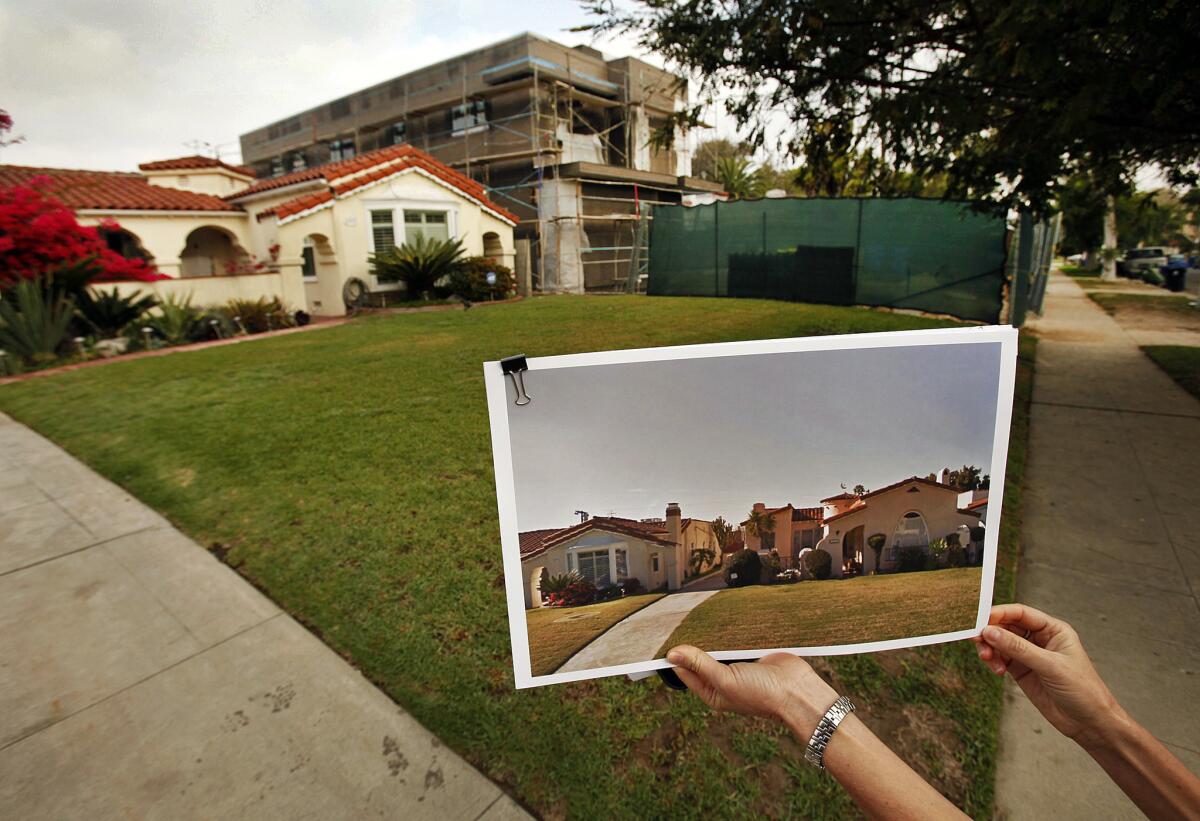L.A. takes a step toward tighter rules to curb mansionization

- Share via
Los Angeles moved one crucial step closer Thursday to tightening city rules meant to stop mansionization – the phenomenon of big, boxy homes popping up on not-so-big lots.
Local politicians first sought to tackle mansionization years ago, passing city rules to curb the size of new and renovated homes based on the size of the lots they were built on.
Neighborhood activists soon complained the rules were riddled with “loopholes” that afforded builders additional square footage and allowed them to continue erecting hefty homes on modest lots. Critics also lamented that some parts of homes – such as attached garages and covered porches -- did not count toward the size limit.
After an impassioned hearing Thursday at City Hall, the Los Angeles City Planning Commission voted to support proposed changes that would eliminate some of those “loopholes.” The planned alterations still must be reviewed by a City Council committee and approved by the council before they can become law.
Many of the proposed changes were welcomed by local residents worried about mansionization: The new rules would no longer allow a 20% bonus in square footage for using ecologically friendly building methods. They would also reduce the square footage that would generally be allowed for homes in residential areas, changing it from 50% to 45% of the lot size. And porches and patios that are covered would count toward the legal limit on building size, rather than being exempt.
However, the recommended changes fall short of what the Los Angeles Conservancy and many neighborhood groups had sought. For instance, the city would continue to exempt hundreds of square feet of attached garages when it calculates how much someone can build.
Residents such as Shelley Wagers, a board member with the Beverly Wilshire Homes Assn., argued that attached garages represented “a tremendous amount of bulk” that should be counted toward the city limitations to prevent massive homes from looming over neighbors.
“It gets so you just want to crawl in a hole and die rather than take a walk in your own neighborhood,” Studio City resident Barry Johnson told the commissioners, urging them to stop exempting attached garages.
The commission, whose members are appointed by Mayor Eric Garcetti, ultimately decided to exempt up to 200 square feet of garage space attached to the front of the home – half of what is now exempt – and retain the existing exemption for up to 400 square feet of garage space for detached garages and garages attached in the rear of a home.
Some residents had also warned that the proposed changes would not do enough to restrict out-of-scale development in the hillsides. Adrian Scott Fine, advocacy director for the Los Angeles Conservancy, said the Planning Commission recommendations were “not perfect, but a middle ground.”
Existing rules to curb mansionization have “a lot of loopholes and shortcomings,” Fine said. “This makes a lot of difference.”
The local chapter of the Building Industry Assn. of Southern California argued that the proposed rules were so restrictive that they would unfairly pinch property values and crimp construction of homes that could accommodate bigger and multi-generational families.
Some L.A. homeowners complained that they or their families would be penalized by the new rules and argued that the restrictions had not been prominently publicized to local residents. Steve Mayer, a father of three who lives in Rancho Park, said that his home would be limited to 2,600 square feet, even though 4,000-square-foot mansions abounded around him.
”They got their mansions,” Mayer said in an interview shortly after he testified at City Hall. “At least give me a chance to expand adequately.”
The planned changes have been years in the making: City Councilman Paul Koretz first proposed that the city tighten its rules more than two years ago. As a stopgap measure, L.A. has already imposed temporary restrictions on the scale of new construction in nearly a score of neighborhoods where residents had complained about mansionization.
Follow me on Twitter at @LATimesEmily
ALSO
California’s students will soon learn more LGBT history in schools
L.A. Police Commission president calls for revisiting LAPD policy on body-camera videos
Tagger known as ‘Liter’ arrested on suspicion of defacing Vietnam veterans memorial in Venice
More to Read
Sign up for Essential California
The most important California stories and recommendations in your inbox every morning.
You may occasionally receive promotional content from the Los Angeles Times.











